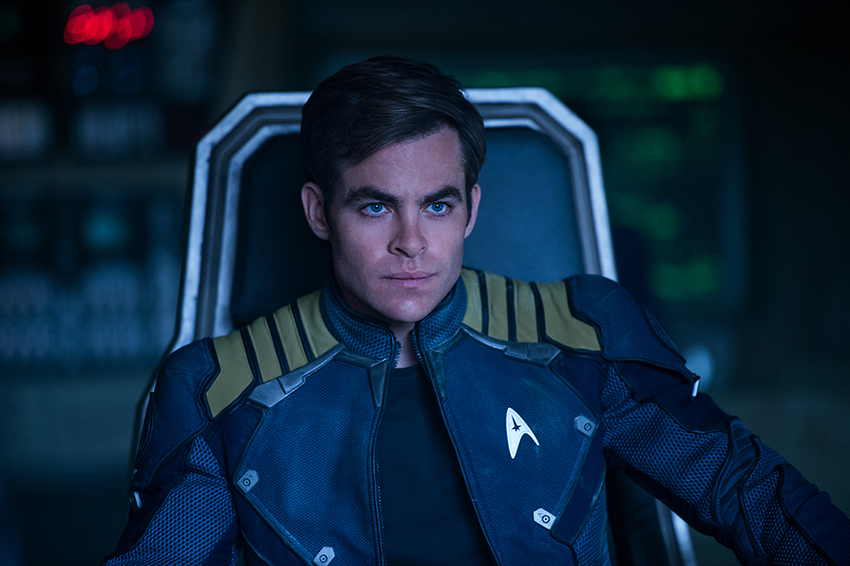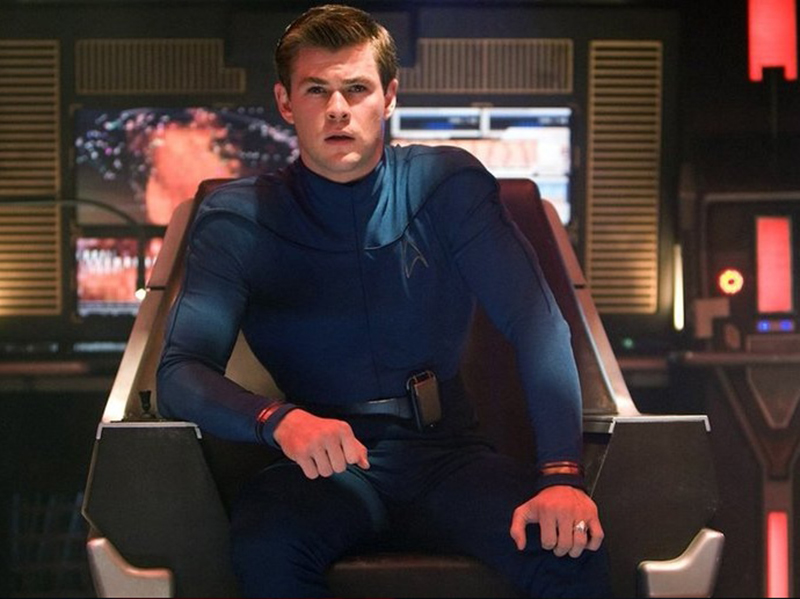
Usually, it’s expected of the captain to go down with the ship, but now two Starfleet captains may be taking the ship down with them as THR is reporting that both Chris Pine and Chris Hemsworth have exited the upcoming Star Trek 4 after contract negotiations fell through. Pine was set to reprise his lead role as the young Captain James T. Kirk – a role first originated by William Shatner in the original Star Trek TV series and movies – while Hemsworth would have played his father, George Kirk, the Captain of the USS Kelvin, who was killed by Nero in the prologue of JJ Abrams’ 2009 reboot.
After the severe failure of 2016’s Star Trek Beyond at the box office – it made just $343 million globally off a $190 million production budget, despite being a genuinely great movie with good reviews – it had looked uncertain if there was even going to be a fourth film in this rebooted sci-fi franchise. However, Paramount quickly stepped in to say that things were indeed moving ahead and there was huge fanfare when SJ Clarkson was tapped to direct, the first female to do so in the franchise’s history. Writers J. D. Payne and Patrick McKay penned a script that would seemingly involve some kind of time travel mechanic to reunite the Kirk father-son duo. With Hemsworth since having become a major international star thanks to his work as Thor for Marvel since 2011 – it’s been reported that it was his brief work in Star Trek that put him on Marvel’s radar initially – this would have been a huge deal.

According to THR’s reports though, both men walked away after accusing Paramount of not honouring existing deals. It would appear that after Star Trek Beyond’s commercial fumble, the studio is adamant about sticking to a tight budget on the film, even it means going against current contract stipulations to give both actors a pay cut. While you can definitely understand Paramount’s reasoning, they also can’t just renege on deals that were already agreed to.
To make things more complicated though, the contract talks for the rest of the cast – Zoe Saldana, Zachary Quinto, Karl Urban, Simon Pegg and John Cho – have all already concluded successfully and they are set to return. So what does Paramount do now? THR points out that there is definitely still a chance for Pine and Hemsworth to return to the negotiating table and for all parties to work out an amenable deal, but what if they don’t? Neither man is lacking for blockbuster franchise work one bit, so this is not do or die for them.
It is certainly possible that Star Trek 4 could go on without them, as the rest of the pitch-perfectly cast ensemble has been just as, if not more warmly welcomed by fans and could definitely carry a film on their own. Paramount may just look to find the middle ground and recast Hemsworth’s George Kirk with a much less expensive actor in order to retain Pine, who is the face of the franchise, at whatever price he is asking for. Heck they may even nix the film’s entire time-travel plot and do something completely different. The only thing that is certain right now, is just how uncertain the future for Star Trek 4 actually is.
Last Updated: August 13, 2018





















For the Emperor!
August 13, 2018 at 10:06
“going against current contract stipulations” – I can’t say I blame them then. On the one side I feel “think about the fans”, on the other side “a deal is a deal so pony up”!
I liked Star Trek Beyond well enough. The only part that irked me was that they got Elba in there and then hid him behind a mask for 90% of the film.
Original Heretic
August 13, 2018 at 10:06
Tricky one.
On one hand, it’s crappy that Paramount is trying to renege on a deal that was already finalised.
In the other hand, this does also come across as the two Chris lads being greedy.
Lex Chung
August 16, 2018 at 07:34
It’s not their fault that Viacom, Paramount and Brad Grey drove the studio into financial failure. Grey got paid $29 million dollars to oversee the debacle that Paramount had become losing over 445 million before his departure and got a golden parachute on top of that. Paramount can’t see fit to honor its financial obligations to their artists but it can afford to pay its former head 5 times that amount for delivering failure after failure.
Beyond’s poor performance can largely be attributed to the overall stupidity of executive management regarding the timing of its release. It doesn’t take a rocket scientist to realize the ideal time to release Star Trek Beyond would have been on its 50th Anniversary instead of months before in the middle of summer to compete with multiple other major competitive releases. Grey was in part a scape goat and their are plenty of other parties at Viacom and Paramount that probably share in the culpability for its failures but I doubt any of the execs took a haircut for it.
The studio has the capital, its just desperate to cut corners wherever it can. If the movie fails and this iteration of the franchise dies Pine and Hemsworth will bear zero responsibility for passing over such a poorly managed IP for better paying opportunities.
Kromas
August 13, 2018 at 10:23
Scrap the movie. Give Star Trek a bit of a break. Before we get more Discovery. 😛
Erik Fossum
August 13, 2018 at 11:15
In what world is a 153 million dollar surplus a “severe failure at the box office”? Why would anyone label it as such?
WickedMONK3Y
August 13, 2018 at 11:53
Because they do not include the marketing and branding costs into the production costs. So you are looking at $ 190 Million production, then re-shoots which adds cost, usually around $ 10m to $ 20m, then typical make-ready costs, and marketing costs anywhere in the region of $ 50m to $ 100m to advertise it globally, etc. etc. and it was estimated that it had to make between $ 350m and $ 400m to break even. If I remember it ended up losing the studio $ 40m or so, because they don’t really tell you the ancillary costs involved to get the movie to market.
Same thing happened with Solo … 🙁
WickedMONK3Y
August 13, 2018 at 11:53
Because they do not include the marketing and branding costs into the production costs. So you are looking at $ 190 Million production, then re-shoots which adds cost, usually around $ 10m to $ 20m, then typical make-ready costs, and marketing costs anywhere in the region of $ 50m to $ 100m to advertise it globally, etc. etc. and it was estimated that it had to make between $ 350m and $ 400m to break even. If I remember it ended up losing the studio $ 40m or so, because they don’t really tell you the ancillary costs involved to get the movie to market.
Same thing happened with Solo … 🙁
Kervyn Cloete
August 13, 2018 at 12:05
As WickedMonk3y explained below, normally you need to add at least 50% (sometimes 100%) of the production budget on top of that to get the true cost to the studio. Since everybody takes their cut, from the cinemas to investors, they need a much higher figure to break even.